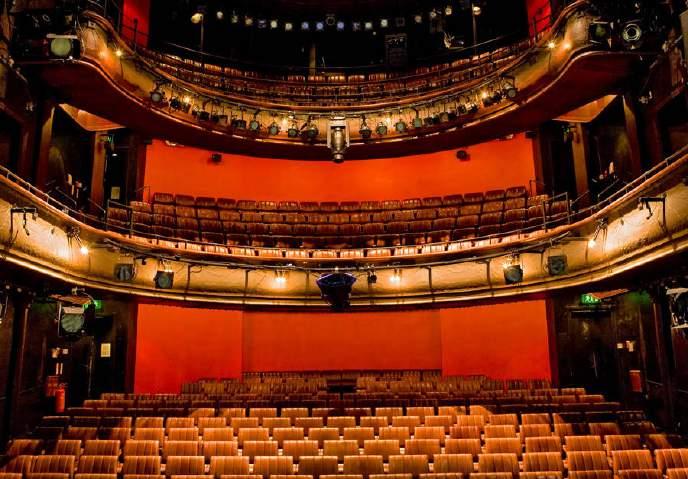
4 minute read
The Simple Resilience of Jewish Students Joel Rosen
On Thursday 12th January 2023, the National Union of Students released the findings of a much-anticipated Kings Counsel investigation into antisemitism within the Union. The report was detailed and damning, with the KC confirming that Jewish students had faced harassment and discrimination. We spent the day briefing journalists, parliamentarians, and sabbatical officers from student unions across the country. It felt a little surreal and daunting. In my first week at UJS, I was tasked with compiling our submission to the Tuck investigation, a few months later, here we were being asked for comment by national and international media. This report attests the mistreatment of generations of brave students’ activists including those who fought this fight decades before I was even born. I hope our re- sponse did them justice and am moved beyond words by their messages of support. The Labour frontbencher and former NUS President Wes Streeting, described the report as, “a vindication of UJS and others who sounded the alarm about NUS’s failure to tackle antisemitism within in its ranks.” He argued that “Jewish students have shown real courage in the face of terrible adversity”. Indeed, this report was the latest blow to the apologists who, having denied antisemitism in the Labour Party, predictably responded the report with inarticulate and frustrated spluttering of incredulity. This is the eighth report that touches on antisemitism in NUS since 2005, a year in which three Jewish students resigned from the union’s executive. At the 2005 conference, the General Union of Palestinian Students (GUPS) distributed a leaflet explaining why “Jews are not a Race” and another leaflet that referencing the Protocols of the Elders of Zion forgery – featured on the GUPS stall. Kosher food was not provided and event for international students was scheduled to take place on a the Jewish sabbath. An NEC member responded to a UJS com-
This report was the latest
Advertisement
apologists.
plaint about the scheduling by lamenting that “When Jewish students cough and sneeze within NUS everyone jumps.” He alleged that UJS were “conspiring with political factions to stab him in the back”. At the 2015 NUS Conference, the UJS stall was graffitied. The report confirms that a Jewish student was targeted by hostile activists after Coca-Cola sponsored the conference, even though they had nothing to do with the sponsorship agreement. They were told by an officer from another university to “Enjoy the sweet taste of a dead baby’s blood in that coke you’re loving”. The officer who used invoked the blood libel would later be elected to NUS Scotland. The Jewish student was escorted around conference by members of their students union’s staff “to protect me because the crowd was particularly hostile towards me”. In 2016 objections to commem- orating Holocaust Memorial Day were applauded. In the words of a Jewish attendee: “I had never come across people who genuinely did not understand the antisemitic nature of the Holocaust. For that position to be applauded was very shocking. It had been tabled to be a unifying motion.” Another recalled that: “no speech had been prepared to answer any objection to marking HMD because I could not believe anyone would object.”
In the years that followed an NUS commissioned report revealed that two thirds of Jewish students disagreed or disagreed strongly that NUS would respond appropriately to allegations of antisemitism if they arose. By April 2022 over a thousand Jewish students accused NUS of creating a ‘climate of fear’ after the organisation invited a disgraced conspiracist to headline their hundredth birthday party.

Against this backdrop, it can be easy to despair, but we should take pride in our united response to the bigotry within NUS. In the space of a few months, we wrote an open letter demanding an investigation, compiled evidence, been interviewed and suggested recommendations. We now have a substantial report that bears witness to the lived experiences of Jewish students and the findings and recommendations of which been accepted in full by the Union. And yet, that is not our story. Despite unrelenting pressure, Jewish life on campus continues. The CST’s campus antisemitism report states that ‘the vast majority of Jewish students have an excellent experience during their studies’. hearing about my work, family friends usually have two responses: “is that an actual job?” or “you’ve got your work cut out” followed by a resigned sigh. I don’t agree with their dispiritedness. Yes, times are tough but I’m incredibly lucky to have the best job in the community. Unremarked by commentators, Jewish students exhibit a brilliant resilience.
Rabbi Harold M. Schulweis argued that “to be an anti-antisemite does not make you a Jew: it simply robs you of Jewish song and poetry, Jewish philosophy and a
Jewish joy.” That is a mindset I see born out by Jewish students in every corner of the UK and Ireland, who refuse to give up on Jewish joy. In the last few months, we’ve set up six new JSocs and are on course to deliver thousands more Friday night dinners than we did last year. We’ve launched new initiatives and re-launched old ones. This spring edition of Aleph showcases a remarkable flourishing of Jewish life on campus, from the Year of Student Sport to the new JSoc at Cork; from Chanukah on Ice to the return of Jewniversity challenge. Every Friday night, dozens of student communities gather, in remote old synagogues and in crowded newbuild accommodation, in university towns and in city centres, if you look you can find Jewish song and Jewish poetry. In the words of OneRepublic: the future looks good.
Features
The
Guy Dabby-Joory, Editor-in-Chief
Sarah Wilks, Senior Editor

Joel Rosen, Senior Editor
Dora Hirsh, News Editor
Grace Silverstein, Design Editor
Leah Mitchell, Editor
Leah Stein, Editor
Hannah Selig, Editor








